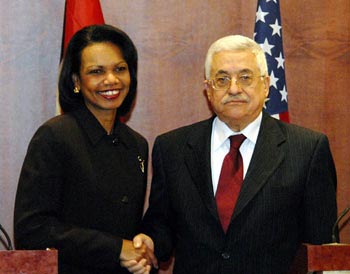| Tools: Save | Print | E-mail | Most Read |
| Palestinian Government Talks At Impasse |
| Adjust font size: |
Palestinian President Mahmoud Abbas yesterday said that talks to achieve a national unity government had reached a "dead end." Meeting with Abbas as her boss, US President George W. Bush, visited neighboring Jordan to discuss the Middle East's other simmering conflict with Iraqi Prime Minister Nouri al-Maliki, Rice called for what she called "humiliations" in Palestinian territories to be eased.
In a gesture of support for Palestinian aspirations, Rice said any future Palestinian state should be "viable" and "contiguous" and that no actions should be taken to prejudge the outcome of a final peace deal. Her words were an apparent reference to Israeli settlement activity in the Abbas said he lamented the difficulties halting the formation of a joint government between the Palestinians' current Hamas rulers and Abbas's own moderate Fatah Party. Such a government is seen as crucial to lifting an international aid boycott imposed on the Palestinian Authority and progressing towards peace. "We have discussed our efforts to form a national unity government. We have exerted efforts we have worked in many directions but unfortunately we have hit a dead end," said Abbas. Despite the setback on a unity government, the meeting succeeded in bringing the The truce ended a five-month Israeli military offensive in the Gaza Strip and the firing of rockets by Palestinian militants into An anonymous senior US State Department official said the He said Rice's meeting with Abbas, and later discussions with Israeli Prime Minister Ehud Olmert in Rice to probe possible new gov't Rice is also expected to determine how close the Palestinians are to forming a moderate coalition government, replacing the current one led by Islamic Hamas militants, who were elected in the January parliamentary elections. Abbas, leader of the rival Fatah party, is leading efforts to assemble a government acceptable to the West and Rice's senior The government Abbas has been working to form is to consist of independent administrators who are not members of Hamas or Fatah, despite having ties to the political parties. Efforts to form the government have been hampered by Hamas' insistence that it control both the key Interior and Finance ministries, which Abbas says must be filled by independents. Rice's trip to Peace efforts have been frozen for six years, since the beginning of the latest Palestinian "intifadah." The "road map" peace plan, presented by Bush in 2003, faltered when neither side carried out its initial obligations. Olmert reached out to the Palestinians on Monday, saying he was prepared to grant them a state, release desperately needed funds and free prisoners if they chose the path of peace. The chief Palestinian negotiator said he believed the cease-fire and Olmert's conciliatory speech earlier this week had created new momentum. "I think it's up to us and the Israelis to make it work," said the negotiator, Saeb Erekat. ( |
| Tools: Save | Print | E-mail | Most Read |
 |
| Related Stories |
|
Product Directory China Search |
Country Search Hot Buys |
